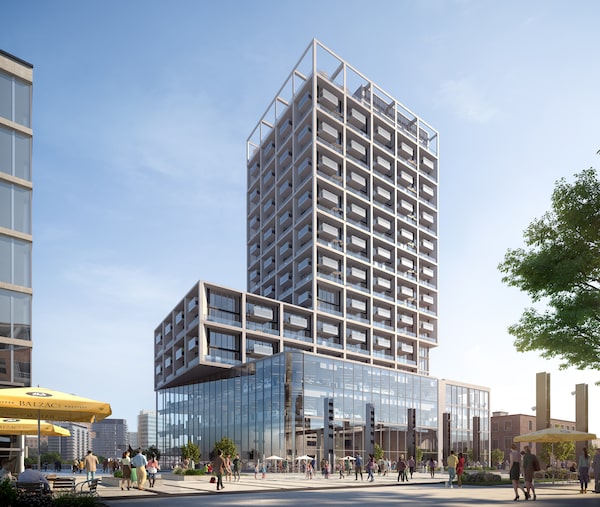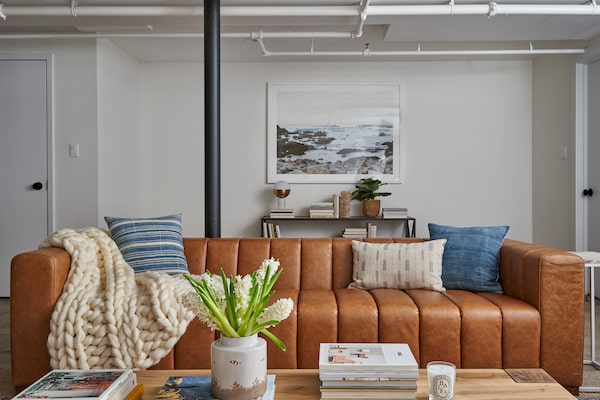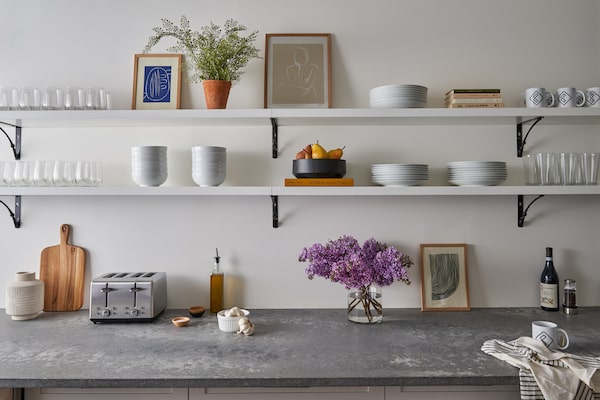
Dream Unlimited Corp.'s 24-storey building in Ottawa is being redeveloped under the 'Zibi' brand.Handout
A new development on the Ottawa River will host the first large-scale purpose-built rental building that employs a novel twist on tenancy known as co-living, which aims to use technology and shared services to take some of the financial sting and lifestyle pain out of sharing apartments with roommates.
Canadian real estate developer Dream Unlimited Corp. is building a 24-storey, 252-bed building on the 34-acre site in Ottawa being redeveloped under the “Zibi” brand and has partnered with U.S.-based co-living company Common Living Inc. to manage the property in its first international expansion. The building is expected to be finished by 2022, and is just one of 42 various use buildings that Dream is planning for the site.
Co-living could be described as an elevated college dorm experience: lots of tenants in small bedrooms sharing common kitchens, lounges and bathrooms. The twist Common adds is service: the rent is one bill that covers everything from furnishings and utilities to WiFi internet, as well some staples supplies (toilet paper, laundry detergent and the like) and it provides weekly cleanings to the common areas. Common also helps organize social programming so tenants can get more out of their shared living arrangements, and almost everything is organized on the company’s smartphone app. The company is one of several U.S. players in the space, but the first to enter the Canadian market.

Common’s Brooklyn Grand building offers an affordable, comfortable transition space that is very appealing to students.Seth Caplan
“This is larger than anything we currently have open … we have buildings with 20 people and we have buildings with hundreds of people ... and we have several under development that are as big or larger" in the pipeline, Brad Hargreaves, CEO of Common, said.
Common began operating in New York City in 2015, and now houses 800 tenants in 27 buildings spread across six U.S. cities. In recent months the company has announced it is investing US$300-million in a mix of construction partnerships in Philadelphia, Atlanta, San Diego and Pittsburgh to bring hundreds of new beds online. It’s not co-investing with Dream in Ottawa. “In this case we’re just a property manager with a long-term contract,” he said.
The idea of an affordable, comfortable transition space is what appealed to Pragya Krishna, 28, a new resident of Common’s Brooklyn Grand building – a six-floor townhouse separated into two suites with 13 tenants per suite. “Everyone’s either working or going to school. I don’t think I’ve ever seen more than two people in the kitchen at the same time,” she said. “I only share my bathroom with one person, definitely an improvement over student housing.”

Common's financial model finds a price point for tenants that’s often cheaper than living alone, but remains more profitable than the typical purpose-built rental for the landlord.Seth Caplan
Krishna, who grew up in India, got a double masters in journalism and international affairs at Columbia University and is currently job-hunting. She practically gushes about her Common experience. “I don’t see myself moving out here,” she said, describing friends living a much less appealing New York rental scenarios: “One of my friends is literally living in the living room. She doesn’t have a door. She has to hang up a curtain for privacy. … It’s really good to not have that nonsense here.”
The way Common’s financial model works is it finds a price point for tenants that’s often cheaper than living alone, but remains more profitable than the typical purpose-built rental for the landlord. “Our sticker price for a bedroom should be a 20 to 25 per cent discount,” over what’s available from similar condo-level amenities and accommodations Hargreaves said. And by providing a tenant density that’s typically 50 per cent higher than a traditional purpose-built renta, and relying on its amenities to keep the units attractive, it’s able to boost its net operating income 20 per cent higher than a typical rental building. Four to six roommates a suite is the sweet spot, Hargreaves said, and the Zibi units are expected to follow that ideal model.

The Zibi units in Ottawa are expected to follow a model similar to Common Grand in Brooklyn, that is four to six roomates per suite.Seth Caplan
The Zibi building plans to offer a roof deck, parking spaces, a gym and at the moment is being priced to start at $1,225 a month, which Common estimates is 31 per cent less than a local market-rate one-bedroom. According to the Canada Mortgage and Housing Corporations’ 2018 figures, rents for two-bedroom units in Ottawa average $1,174, but are 26 per cent higher in buildings completed since 2005 and condominium rents are 19 per cent higher than average.
“Affordability in housing in Canada is extremely important and we think this co-living is the kind of thing that could be exciting, a really cool wonderful way not just to live but be part of a community,” Dream’s Michael Cooper said. He says Dream is trying to build something unique on the former industrial site – it hosted a paper mill for more than 100 years – that straddles Chaudière and Albert islands. “We’re trying to program a place in Ottawa that everyone’s gonna want to be at and we’re looking for a mix of different things to do there and different uses: living, shopping, working and playing.”
The business model doesn’t have a high barrier to entry, but Cooper said Dream has no plans to copy the scheme and cut out the middleman. “If we could do it, we would have done it. It’s a completely different business and it would take so much effort on our part,” he said. “We try to specialize in things we think we’re good at and we try to work with people who are already excellent at what we can’t do.”
In fact, he’d be interested in working more with Common as it explores more opportunities in Canada.
“We’re talking to people in a number of cities in Canada. The markets we have primarily focused on to date are Ottawa and Toronto,” Hargreaves said, who said the company is looking at adding 500 Common beds in the country’s largest city.
Your house is your most valuable asset. We have a weekly Real Estate newsletter to help you stay on top of news on the housing market, mortgages, the latest closings and more. Sign up today.
 Shane Dingman
Shane Dingman